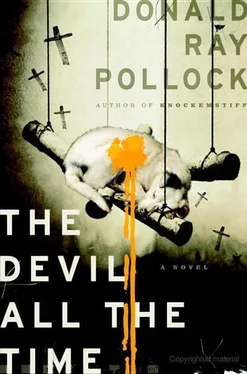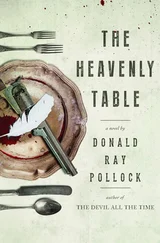Private Willard Russell had been drinking in the back of the bus with two sailors from Georgia, but one had passed out and the other had puked in their last jug. He kept thinking that if he ever got home, he’d never leave Coal Creek, West Virginia, again. He’d seen some hard things growing up in the hills, but they didn’t hold a candle to what he’d witnessed in the South Pacific. On one of the Solomons, he and a couple of other men from his outfit had run across a marine skinned alive by the Japanese and nailed to a cross made out of two palm trees. The raw, bloody body was covered with black flies. They could still see the man’s heart beating in his chest. His dog tags were hanging from what remained of one of his big toes: Gunnery Sergeant Miller Jones. Unable to offer anything but a little mercy, Willard shot the marine behind the ear, and they took him down and covered him with rocks at the foot of the cross. The inside of Willard’s head hadn’t been the same since.
When he heard the tubby bus driver yell something about a break, Willard stood up and started toward the door, disgusted with the two sailors. In his opinion, the navy was one branch of the military that should never be allowed to drink. In the three years he’d served in the army, he hadn’t met a single swabby who could hold his liquor. Someone had told him that it was because of the saltpeter they were fed to keep them from going crazy and fucking each other when they were out to sea. He wandered outside the bus depot and saw a little restaurant across the street called the Wooden Spoon. There was a piece of white cardboard stuck in the window advertising a meat loaf special for thirty-five cents. His mother had fixed him a meat loaf the day before he left for the army, and he considered that a good sign. In a booth by the window, he sat down and lit a cigarette. A shelf ran around the room, lined with old bottles and antique kitchenware and cracked black-and-white photographs for the dust to collect on. Tacked to the wall by the booth was a faded newspaper account of a Meade police officer who’d been gunned down by a bank robber in front of the bus depot. Willard looked closer, saw that it was dated February 11, 1936. That would have been four days before his twelfth birthday, he calculated. An old man, the only other customer in the diner, was bent over at a table in the middle of the room slurping a bowl of green soup. His false teeth rested on top of a stick of butter in front of him.
Willard finished the cigarette and was just getting ready to leave when a dark-haired waitress finally stepped out of the kitchen. She grabbed a menu from a stack by the cash register and handed it to him. “I’m sorry,” she said, “I didn’t hear you come in.” Looking at her high cheekbones and full lips and long, slender legs, Willard discovered, when she asked him what he wanted to eat, that the spit had dried in his mouth. He could barely speak. That had never happened to him before, not even in the middle of the worst fighting on Bougainville. While she went to put the order in and get him a cup of coffee, the thought went through his head that just a couple of months ago he was certain that his life was going to end on some steamy, worthless rock in the middle of the Pacific Ocean; and now here he was, still sucking air and just a few hours from home, being waited on by a woman who looked like a live version of one of those pinup movie angels. As best as Willard could ever tell, that was when he fell in love. It didn’t matter that the meat loaf was dry and the green beans were mushy and the roll as hard as a lump of #5 coal. As far as he was concerned, she served him the best meal he ever had in his life. And after he finished it, he got back on the bus without even knowing Charlotte Willoughby’s name.
Across the river in Huntington, he found a liquor store when the bus made another stop, and bought five pints of bonded whiskey that he stuck away in his pack. He sat in the front now, right behind the driver, thinking about the girl in the diner and looking for some indication that he was getting close to home. He was still a little drunk. Out of the blue, the bus driver said, “Bringing any medals back?” He glanced at Willard in the rearview mirror.
Willard shook his head. “Just this skinny old carcass I’m walking around in.”
“I wanted to go, but they wouldn’t take me.”
“You’re lucky,” Willard said. The day they’d come across the marine, the fighting on the island was nearly over, and the sergeant had sent them out looking for some water fit to drink. A couple of hours after they buried Miller Jones’s flayed body, four starving Japanese soldiers with fresh bloodstains on their machetes came out of the rocks with their hands up in the air and surrendered. When Willard and his two buddies started to lead them back to the location of the cross, the soldiers dropped to their knees and started begging or apologizing, he didn’t know which. “They tried to escape,” Willard lied to the sergeant later in the camp. “We didn’t have no choice.” After they had executed the Japs, one of the men with him, a Louisiana boy who wore a swamp rat’s foot around his neck to ward off slant-eyed bullets, cut their ears off with a straight razor. He had a cigar box full of ones he’d already dried. His plan was to sell the trophies for five bucks apiece once they got back to civilization.
“I got an ulcer,” the bus driver said.
“You didn’t miss nothing.”
“I don’t know,” the bus driver said. “I sure would have liked to got me a medal. Maybe a couple of them. I figure I could have killed enough of those Kraut bastards for two anyway. I’m pretty quick with my hands.”
Looking at the back of the bus driver’s head, Willard thought about the conversation he’d had with the gloomy young priest on board the ship after he confessed that he’d shot the marine to put him out of his misery. The priest was sick of all the death he’d seen, all the prayers he’d said over rows of dead soldiers and piles of body parts. He told Willard that if even half of history was true, then the only thing this depraved and corrupt world was good for was preparing you for the next. “Did you know,” Willard said to the driver, “that the Romans used to gut donkeys and sew Christians up alive inside the carcasses and leave them out in the sun to rot?” The priest had been full of such stories.
“What the hell’s that got to do with a medal?”
“Just think about it. You’re trussed up like a turkey in a pan with just your head sticking out a dead donkey’s ass; and then the maggots eating away at you until you see the glory.”
The bus driver frowned, gripped the steering wheel a little tighter. “Friend, I don’t see what you’re getting at. I was talking about coming home with a big medal pinned to your chest. Did these Roman fellers give out medals to them people before they stuck ’em in the donkeys? Is that what you mean?”
Willard didn’t know what he meant. According to the priest, only God could figure out the ways of men. He licked his dry lips, thought about the whiskey in his pack. “What I’m saying is that when it comes right down to it, everybody suffers in the end,” Willard said.
“Well,” the bus driver said, “I’d liked to have my medal before then. Heck, I got a wife at home who goes nuts every time she sees one. Talk about suffering. I worry myself sick anytime I’m out on the road she’s gonna take off with a purple heart.”
Willard leaned forward and the driver felt the soldier’s hot breath on the back of his fat neck, smelled the whiskey fumes and the stale traces of a cheap lunch. “You think Miller Jones would give a shit if his old lady was out fucking around on him?” Willard said. “Buddy, he’d trade places with you any goddamn day.”
Читать дальше












